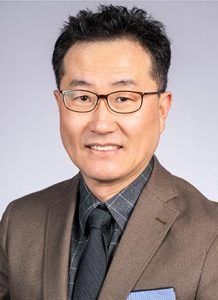July 13, 2020

Mechanical and Aerospace Engineering Professor Chanwoo Park
Unmanned aerial vehicles (UAVs) are a major tool in the current arsenal for the U.S. military. They are used ever increasingly for a variety of missions to help keep personnel out of harm’s way.
A UAV must perform well in all environmental conditions, powered by a reliable internal combustion engine and/or electric propulsion. However, the heat generated from its engine and energy storage system (e.g., battery) can cause UAVs to run inefficiently. They will eventually fail if the heat is not removed properly.
With UAVs needing to perform more challenging missions while maintaining high reliability, Chanwoo Park’s research into advanced cooling technologies such as two-phase cooling (boiling condensation) and heat storage is a perfect match to develop an optimal solution for UAV thermal management. Park, an associate professor in the Department of Mechanical and Aerospace Engineering, was recently awarded a 3-year contract from the U.S. Army Research Laboratory (ARL) for UAV thermal management research.
“I pioneered Li-ion battery and electrical vehicles’ thermal management technologies starting in 2001 during my time as a research specialist at the Ford Research & Advanced Engineering Laboratory. I also initiated pumped two-phase cooling technologies in 2006 at the Advanced Cooling Technologies” Park said. “The Army appreciated my research portfolio and experience with thermal management of rechargeable battery systems and electric-drive vehicles, and cutting-edge two-phase cooling technologies in receiving this award from them.”
Researching the Best Design
This award will allow Park’s group to develop high-performance UAV cooling architectures and thermal management solutions incorporating with conventional and advanced thermal management technologies tailored to military mission requirements and also potentially improve battery thermal management technologies for heavily-electrified future UAVs. Once developed, this research should greatly increase UAV mission capabilities and performance, and make advanced computational and design methodologies accessible for UAV researchers and engineers.
“This research will allow the military develop its UAVs with more extended missions and improved capability using the computational and design tools to speed up the R&D process,” Park said. “There are potential commercial applications for our research, as well.”
“The potential design is fairly open right now. We’ll look at the best cooling design for a fully electrical, a hybrid or an internal combustion engine,” Park said. “But we also need to take into account the cooling system efficiency, its weight and volume, which includes the coolant used.”
Graduate and undergraduate students will have the opportunity to be part of Park’s research team. They will directly work on the project and at summer internship opportunities at the Army research facility. Students interested in being part of this UAV project should directly reach out to Park.
“They can work on this project daily so they can learn in-demand skills and the theory behind the work. This project will create a lot of research and engineering opportunities for students,” Park said.